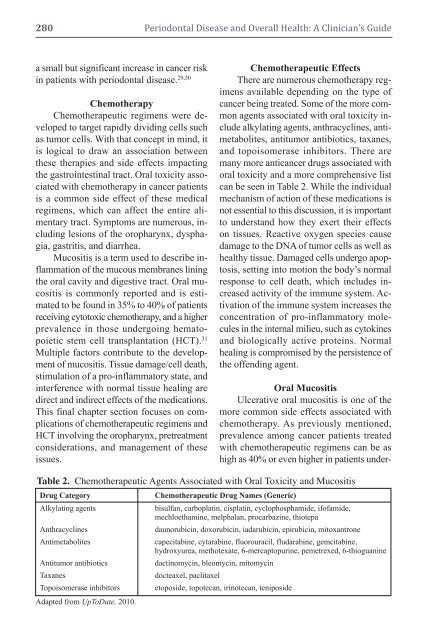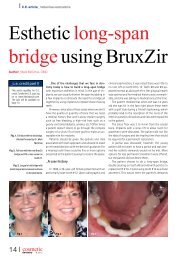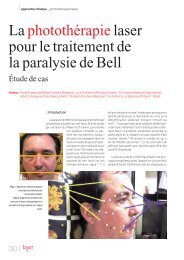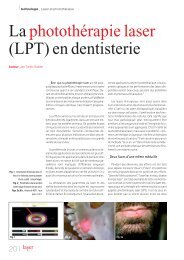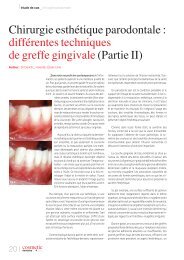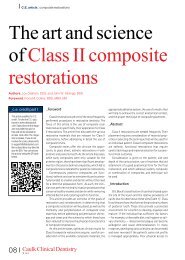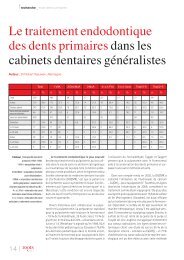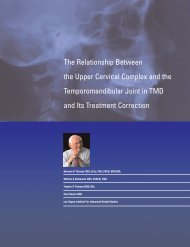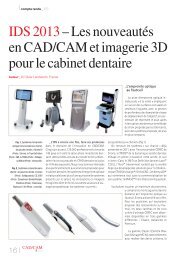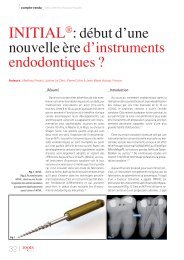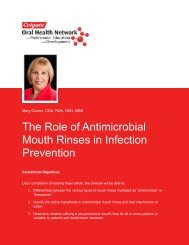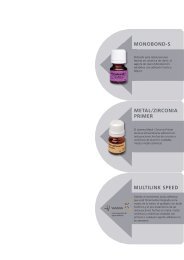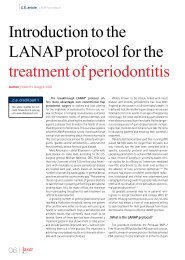Periodontal Disease and Overall Health: A Clinician's Guide
Periodontal Disease and Overall Health: A Clinician's Guide
Periodontal Disease and Overall Health: A Clinician's Guide
Create successful ePaper yourself
Turn your PDF publications into a flip-book with our unique Google optimized e-Paper software.
280 <strong>Periodontal</strong> <strong>Disease</strong> <strong>and</strong> <strong>Overall</strong> <strong>Health</strong>: A <strong>Clinician's</strong> <strong>Guide</strong>a small but significant increase in cancer riskin patients with periodontal disease. 29,30ChemotherapyChemotherapeutic regimens were developedto target rapidly dividing cells suchas tumor cells. With that concept in mind, itis logical to draw an association betweenthese therapies <strong>and</strong> side effects impactingthe gastrointestinal tract. Oral toxicity associatedwith chemotherapy in cancer patientsis a common side effect of these medicalregimens, which can affect the entire alimentarytract. Symptoms are numerous, includinglesions of the oropharynx, dysphagia,gastritis, <strong>and</strong> diarrhea.Mucositis is a term used to describe inflammationof the mucous membranes liningthe oral cavity <strong>and</strong> digestive tract. Oral mucositisis commonly reported <strong>and</strong> is estimatedto be found in 35% to 40% of patientsreceiving cytotoxic chemotherapy, <strong>and</strong> a higherprevalence in those undergoing hematopoieticstem cell transplantation (HCT). 31Multiple factors contribute to the developmentof mucositis. Tissue damage/cell death,stimulation of a pro-inflammatory state, <strong>and</strong>interference with normal tissue healing aredirect <strong>and</strong> indirect effects of the medications.This final chapter section focuses on complicationsof chemotherapeutic regimens <strong>and</strong>HCT involving the oropharynx, pretreatmentconsiderations, <strong>and</strong> management of theseissues.Chemotherapeutic EffectsThere are numerous chemotherapy regimensavailable depending on the type ofcancer being treated. Some of the more commonagents associated with oral toxicity includealkylating agents, anthracyclines, anti -metabolites, antitumor antibiotics, taxanes,<strong>and</strong> topoisomerase inhibitors. There aremany more anticancer drugs associated withoral toxicity <strong>and</strong> a more comprehensive listcan be seen in Table 2. While the individualmechanism of action of these medications isnot essential to this discussion, it is importantto underst<strong>and</strong> how they exert their effectson tissues. Reactive oxygen species causedamage to the DNA of tumor cells as well ashealthy tissue. Damaged cells undergo apoptosis,setting into motion the body’s normalresponse to cell death, which includes increasedactivity of the immune system. Activationof the immune system increases theconcentration of pro-inflammatory moleculesin the internal milieu, such as cytokines<strong>and</strong> biologically active proteins. Normalhealing is compromised by the persistence ofthe offending agent.Oral MucositisUlcerative oral mucositis is one of themore common side effects associated withchemotherapy. As previously mentioned,prevalence among cancer patients treatedwith chemotherapeutic regimens can be ashigh as 40% or even higher in patients under -Table 2. Chemotherapeutic Agents Associated with Oral Toxicity <strong>and</strong> MucositisDrug CategoryChemotherapeutic Drug Names (Generic)Alkylating agentsbisulfan, carboplatin, cisplatin, cyclophosphamide, ifofamide,mechloethamine, melphalan, procarbazine, thiotepaAnthracyclinesdaunorubicin, doxorubicin, iadarubicin, epirubicin, mitoxantroneAntimetabolitescapecitabine, cytarabine, fluorouracil, fludarabine, gemcitabine,hydroxyurea, methotexate, 6-mercaptopurine, pemetrexed, 6-thioguanineAntitumor antibioticsdactinomycin, bleomycin, mitomycinTaxanesdocteaxel, paclitaxelTopoisomerase inhibitors etoposide, topotecan, irinotecan, teniposideAdapted from UpToDate, 2010.


